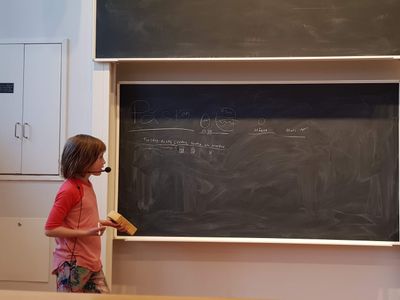- Introduction to computer science education theory and learning in computer science. Research on learning in computer science.
- Legal certainty and legal security. Conduct towards students, equality and fairness in teaching context.
- Constructive alignment. Outcome based teaching and examination.
- Planning of teaching. Presentation techniques. Tutoring techniques.
- Methods and tools in computer science teaching.
- Placement as teaching assistant/lab assistant in some course in computer science.
DA1700 Tutoring, Teaching and Learning in Computer Science Education 3.0 credits

This course is both a training course for those who are already teaching assistants and provides a foundation for students who want to do degree work with a computer science didactic focus. It also provides knowledge and skills that are common in working life, where many professions contain elements of teaching. Students who have not yet worked as teaching assistants but who are interested in teaching are also welcome to take the course.
The course contains teaching practice (which is included in the course credits but will not be paid).
Information per course offering
Choose semester and course offering to see current information and more about the course, such as course syllabus, study period, and application information.
Information for Spring 2026 hulda26 programme students
- Course location
KTH Campus
- Duration
- 13 Jan 2026 - 1 Jun 2026
- Periods
Spring 2026: P3 (1.5 hp), P4 (1.5 hp)
- Pace of study
10%
- Application code
60149
- Form of study
Normal Daytime
- Language of instruction
Swedish
- Course memo
- Course memo is not published
- Number of places
Places are not limited
- Target group
- Open to all programmes as long as it can be included in your programme.
- Planned modular schedule
- [object Object]
- Schedule
- Part of programme
- No information inserted
Contact
Course syllabus as PDF
Please note: all information from the Course syllabus is available on this page in an accessible format.
Course syllabus DA1700 (Spring 2021–)Content and learning outcomes
Course contents
Intended learning outcomes
After passing the course, the student should be able to
- plan, carry out and evaluate learning activities taking stated intended learning outcomes and computer science education theory into account
- respond to students with empathy and respect in accordance with regulations for equality and fundamental values
- assess students' abilities, learning and development towards stated intended learning outcomes and in a constructive way communicate the assessment to the students
in order to
- develop as a teaching assistant in programming and computer science courses
- be able to tutor and teach in professional life
- obtain qualifications needed to do a degree project with specialisation in computer science education.
Literature and preparations
Specific prerequisites
Completed course in basic computer science equivalent to DD1338, DD1320, DD1321 or DD1327.
Literature
Examination and completion
Grading scale
Examination
- PRA1 - Practical training, 1.0 credits, grading scale: P, F
- SEM1 - Seminar assignments, 2.0 credits, grading scale: P, F
Based on recommendation from KTH’s coordinator for disabilities, the examiner will decide how to adapt an examination for students with documented disability.
The examiner may apply another examination format when re-examining individual students.
If the course is discontinued, students may request to be examined during the following two academic years.
Examiner
Ethical approach
- All members of a group are responsible for the group's work.
- In any assessment, every student shall honestly disclose any help received and sources used.
- In an oral assessment, every student shall be able to present and answer questions about the entire assignment and solution.
Further information
Course room in Canvas
Offered by
Main field of study
Education cycle
Supplementary information
In this course, the EECS code of honor applies, see:
http://www.kth.se/en/eecs/utbildning/hederskodex.